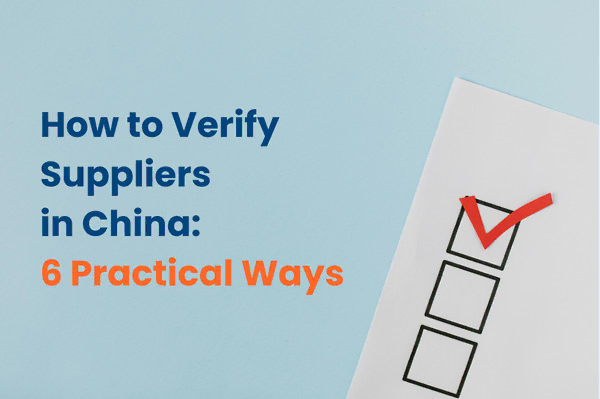How to Audit and Evaluate Target Suppliers for Your Supply Chain
- Date:
- Author: SVI Content Team
- Share:

Target is one of the largest retailers in the United States, with nearly 2000 stores across the country. It’s no surprise that it has strict requirements for the Target suppliers that it works with, because Target upholds high standards for the products it carries, promising quality and safety for customers.
To become a Target supplier, businesses must undergo thorough factory audits as part of Target’s vendor compliance program. The factory audits are a critical step in confirming suppliers meet Target’s standards before their products are approved for sale in store and online.
In this article, we will explore Target’s audit requirements and provide you with the essential information to successfully pass the audit. By following our guidance, you’ll better understand what to take to ensure your operations comply with Target’s standards to avoid the potential consequences of failing an audit.
Part 1. How to Be a Target Supplier: Key Requirements
If you want to sell to Target, you must meet Target’s strict criteria. Here’s a concise list of its vendor requirements:
a) Quality and Safety Standards: Adhere to high product quality and safety protocols.
b) Sustainability Compliance: Align with Target’s sustainability goals, including environmental permits.
c) Ethical Practices: Follow Target’s Business Partner Code of Conduct emphasizing ethical behavior.
d) Legal Compliance: Comply with laws and regulations regarding product safety and business operations.
e) Documentation: Obtain and maintain all necessary environmental permits and business licenses.
f) Performance Evaluation: Subject to ongoing performance evaluations and audits.
Target’s customers expect high-quality products, and the company holds its suppliers accountable for delivering on this promise. This is one main reason why Target conducts audits on its suppliers to ensure the products meet Target’s quality expectations before reaching consumers.
In addition to quality, Target also evaluates its retail suppliers based on their ethical and sustainable practices. Target is committed to promoting responsible and sustainable business conduct, so, it expects its suppliers to share the same standards — respecting human rights and environmental stewardship.
The actions of its suppliers will reflect on Target. By verifying that partners comply with the company’s expectations, it earns the trust of its customers, gains a reputation for its responsible and sustainable practices, and shields both parties from the consequences of unethical actions, thereby creating a safe and reliable supply chain.
Part 3. Different Types of Target Factory Audits
Target has a reputation for quality and ethical sourcing, and as such, it places a high priority on conducting factory evaluations to ensure that its suppliers meet its standards. And it will conduct regular audits to make sure they are qualified and able to take corrective action if necessary.
For factory evaluation, Target typically focuses on three different audits:
- Factory Assessment Audit (Quality Control)
- Responsible Sourcing & Sustainability Audit (Human Rights)
- C-TPAT Audit (Security)
a) Factory Assessment Audit (Quality Control) Is a Top Priority for Target
Factory Assessment Audit (Quality Control) is a top priority for Target, and its internal teams are responsible for conducting these quality control inspections. This involves a thorough review of the factory facility and various documents and records related to the quality management system.
Target’s production processes also include checking quality manuals, approved supplier lists, purchase orders, incoming material and finished product records, inspection methods and records, training plans for workers, corrective action procedures, customer complaint procedures, and machine safety guidelines.
The Target audit checklist is designed to ensure that the factory meets the necessary quality standards and that all processes are properly documented and controlled.
b) Responsible Sourcing & Sustainability Audits (Human Rights) are Also Critical
Target is committed to ensuring that its suppliers operate ethically and responsibly, and it hires third-party audit companies like BV or SGS to conduct unannounced RS audits. This Responsible Sourcing program aims to ensure that Target’s products are made in factories that treat workers with respect, provide safe and healthy working conditions, and adhere to environmental standards.
The retail company requires its suppliers to comply with the company’s Code of Conduct, which sets out ethical and social standards for suppliers. The code covers a range of issues, including child labor, forced labor, working hours, wages, health and safety and others that may impact the rights of workers in the factory.
In addition, Target is committed to promoting sustainable practices in its supply chain. Target will examine environmental permits, environmental management systems, and business operating licenses of suppliers while encouraging them to adopt sustainable manufacturing practices, such as reducing energy and water use and minimizing waste.
c) C-TPAT (Security) Audit to Prevent Terrorism-related Activities
C-TPAT (security) Audit focuses on ensuring that the factory has appropriate measures in place to prevent terrorism-related activities. These audits are typically conducted by third-party companies, and Target accepts the scan report issued by these auditors.
Part 4. How to Improve the Score on a Target Supplier Evaluation
To ensure ongoing compliance, Target audits their suppliers on an annual basis. Rather than viewing the audit as a one-time occurrence, factories can aim for continuous improvement in their operations. This involves establishing improvement objectives and regularly measuring and assessing progress towards these goals.
Based on Target audit reports, Target categorizes suppliers into four performance levels:
- Outstanding: Suppliers are compliant with all standards, with minimal or no issues identified.
- Acceptable: Only a few non-critical violations are found.
- Needs Improvement: Several non-critical violations are identified.
- Non-Compliant: Fail to meet critical compliance requirements.
If a factory has received a low score on an audit, it’s important to take the findings seriously and implement corrective actions to address any issues. This could include anything from improving working conditions for employees to improving environmental sustainability practices.
✔ Consequences of Failing a Compliance Audit
Target conducts factory audits to ensure that its suppliers meet its standards for quality, safety, and working conditions. In cases where factories fail a Target audit, fines and penalties may be imposed. Consequences are divided into three stages:
Stage 1: First Violation – Warning + Potential Fine
If a factory has its first critical failure during an audit but submits a proper and approved Corrective Action Plan (CAP), there will be no fine.
If a factory has its first critical failure during an audit and fails to take any corrective action or submit a CAP, it will be fined $1,000 USD.
Stage 2: Second Violation – Vendor Probation + Fine
If a factory has a second critical failure during an audit, they will be fined $5,000 USD, and put on probation, and their business opportunities for future projects will be limited.
Stage 3: Third Violation – Vendor Deactivation + Fine
If a factory receives a third critical failure issue during an audit, it will be fined $10,000 USD and completely deactivated from doing business with Target for at least one year.
Suppliers should take steps to ensure compliance with Target’s standards to avoid penalties and maintain their ability to do business with Target.
✔ The 3-Strike Policy for Target Suppliers
Target has a zero-tolerance policy for certain violations known as “Strike Violations.” If a factory commits any of the 10 Strike Violations, it will be considered as “Non-Compliant” and face serious consequences, including a minimum fine of $25,000 USD and an immediate ban from doing business with Target for at least one year.
In addition, if a factory is found to be involved in three Strike Violations within a three-year period, it will face a three-year suspension from doing business with Target.
Here are the 10 Strike Violations:
- Unauthorized Subcontracting
- Prison or Forced Labor
- Invalid, Absent or Falsified Documents
- Circumventing of QC Process
- Bribery
- Underage Labor
- Corporal Punishment, Discrimination, and Harassment
- Sandblasting
- Illegal Industrial Waste-Water Discharge
- Making Hiring and Compensation Decisions Based on Personal characteristics
In case of any of the above violations, not only will the factory be suspended for three years, but also the already shipped goods will be returned. To avoid such penalties, factories must follow Target’s Standards of Vendor Engagement and work towards continuous improvement.
Wrapping Up
This blog shows you the requirements you should comply with, and the details of Target audit. It is important to stick with Target’s standards to pass the audit and avoid serious violations, such as those outlined in Target’s 3-Strike Policy.
To become a Target supplier and improve your performance on factory audits, businesses require an ongoing commitment to quality, ethical practices, and legal compliance. By proactively addressing audit findings, implementing corrective actions, and ensuring compliance with all of Target’s standards, suppliers can maintain a strong business relationship with the retailer.
SVI Global has been managing supply chains for companies selling to major US retailers for over 20 years, giving us a wealth of experience in factory audits of various retailer standards. Our quality assurance team works with new factories each year to help them improve and meet the compliance requirements of major retailers.
If you’re facing concerns or issues related to having your supplier pass a retailer audit, we are here to help. Our retailer expertise can help you identify and address any compliance gaps, ensuring that you meet all of Target’s requirements and maintain a successful business partnership with it.






